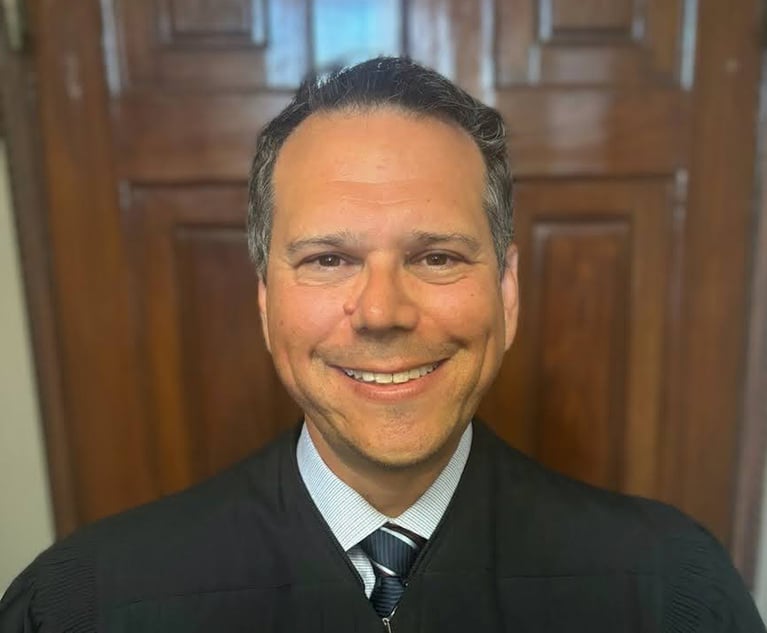Experts Say 2019 Will Be Most Aggressive Year Ever for State AG Litigation
New York Attorney General Letitia James led a coalition of six states and New York City in filing a lawsuit against the U.S. Environmental Protection Agency for allegedly failing to regulate interstate smog pollution.
February 11, 2019 at 10:09 AM
5 minute read
The original version of this story was published on New York Law Journal
 Lori Kalani and Bernie Nash, Cozen O'Connor.
Lori Kalani and Bernie Nash, Cozen O'Connor.
When Lori Kalani was senior in-house counsel and director of government affairs for DISH Network Corp. a few years ago, she visited every state attorney general's office to better understand how and why they worked the way they did.
After joining a law firm, Kalani went on to form her own state attorneys general practice, counseling clients on business transactions, investigations and disputes with state agencies. Now she co-chairs the state attorneys general practice at Cozen O'Connor in Washington, D.C., along with Bernie Nash, who has worked with state attorneys general for 30 years and founded the country's first state attorneys general private practice.
In a recent interview, the pair talked about how the practice has changed over the years, how aggressive state attorneys general have become in going after corporations, and what legal actions companies are likely to see from state attorneys general in 2019. They also publish a weekly state attorneys general practice blog.
Nash said they expect 2019 to become the most aggressive year yet for state attorney general litigation, in part because of politics.
“They are more political today,” Kalani said of the attorneys general. “They may be lawyers and prosecutors, but they are also politicians.”
Nash agreed, saying, “The newer class of attorney general is not coming up as lawyers but more through the political system. It's a steppingstone. In 2018, something like 10 sitting state attorneys general ran for governor or for Congress.”
Kalani added, “Working on these big, high-profile cases that the press is very interested in is good for an attorney general who wants to run for higher office.”
Two of the most highly active state attorney general offices—that of Xavier Becerra in California and Letitia James in New York—did not return messages seeking comment.
Nash said many of the newly elected state attorneys general in 2018, like Becerra and James, ran on platforms of activism. “They vowed to be more aggressive where the Trump administration has rolled back protections,” such as in the consumer and environmental areas, he said.
He also predicted more state attorney general scrutiny of consumer-related businesses, including health care in general and hospitals in particular, as well as telecommunications and the energy industry. “Those industries are more at risk,” he said.
Kalani added technology, and specifically data privacy issues, as areas to watch. “Data breaches, and how companies collect data and what they're doing with it, are ongoing concerns for attorneys general,” she said.
Where tech and consumer issues cross is another hot spot for state attorney general attention, they said. Uber, the ride-hailing service, is one example, Kalani said, where states are looking at providing more protection for consumers. Another is the real estate market.
“When you can buy or sell a house through an app, or get a loan through an app, and it can occur without a broker or realtor, that's a big deal,” she said. “The state attorneys general will be concerned about the whole process.”
Kalani said they also expect attorneys general to focus on antitrust issues across several industries and be more vocal on labor issues. “Traditionally attorneys general didn't work in that space, but then we saw the U.S. Department of Labor's handling of issues like non-compete clauses and flexible scheduling. State attorneys general have launched investigations into labor policies now.”
Attorneys general will become more aggressive and creative when they feel people are not being protected by the federal government, Nash said. “When the federal government is taking action, the states don't feel they need to be so aggressive,” he explained.
That is especially true, he said, in areas where the federal government has rolled back protections.
One example is the U.S. Department of Justice's reversal in January 2018 of an Obama administration policy allowing recreational use of marijuana. Another example is DOJ's Office of Legal Counsel in January reversing an earlier opinion that said in effect that non-sports gambling was legal in the U.S. States that legalized online gambling based on the earlier opinion were blindsided.
“Such rollbacks create such volatility and uncertainty for companies that have invested money based on the earlier opinion,” Kalani said.
Nash added, “If every few years every administration changes those policies, we are no longer operating under the rule of law with predictability so companies can make long-term decisions.”
One other state attorney general trend the lawyers are seeing is a willingness to cross party lines and work together on certain issues. “We're seeing it now with the investigations into opioid manufacturers,” Kalani said. “And a few years ago with the bank mortgage settlements. They also tend to work together on data breach cases.”
Some of the attorneys general are also taking on the Trump administration directly. For example, California's Becerra on Friday announced that his state, along with Massachusetts and the District of Columbia, is leading a coalition of 22 attorneys general opposing the U.S. Department of Homeland Security's attempted deportation of temporarily protected immigrants to Haiti, El Salvador, Nicaragua and Sudan. The AG's amicus brief asks the U.S. Court of Appeals for the Ninth Circuit to uphold a preliminary nationwide injunction that plaintiffs obtained in the district court.
And on Jan. 31, New York Attorney General Letitia James led a coalition of six states and New York City in filing a lawsuit against the U.S. Environmental Protection Agency for allegedly failing to regulate interstate smog pollution.
This content has been archived. It is available through our partners, LexisNexis® and Bloomberg Law.
To view this content, please continue to their sites.
Not a Lexis Subscriber?
Subscribe Now
Not a Bloomberg Law Subscriber?
Subscribe Now
NOT FOR REPRINT
© 2025 ALM Global, LLC, All Rights Reserved. Request academic re-use from www.copyright.com. All other uses, submit a request to [email protected]. For more information visit Asset & Logo Licensing.
You Might Like
View All
Litigators of the Week: Simpson Thacher and ACLU Team To Challenge Louisiana's Ten Commandments Law

A Reporter and a Mayor: Behind the Scenes During the Eric Adams Indictment News Cycle

Even With New Business Courts, Texas Is a Long Way from Taking Delaware's Corporate Law Mantle
5 minute read
Trending Stories
- 1Uber Files RICO Suit Against Plaintiff-Side Firms Alleging Fraudulent Injury Claims
- 2The Law Firm Disrupted: Scrutinizing the Elephant More Than the Mouse
- 3Inherent Diminished Value Damages Unavailable to 3rd-Party Claimants, Court Says
- 4Pa. Defense Firm Sued by Client Over Ex-Eagles Player's $43.5M Med Mal Win
- 5Losses Mount at Morris Manning, but Departing Ex-Chair Stays Bullish About His Old Firm's Future
Who Got The Work
J. Brugh Lower of Gibbons has entered an appearance for industrial equipment supplier Devco Corporation in a pending trademark infringement lawsuit. The suit, accusing the defendant of selling knock-off Graco products, was filed Dec. 18 in New Jersey District Court by Rivkin Radler on behalf of Graco Inc. and Graco Minnesota. The case, assigned to U.S. District Judge Zahid N. Quraishi, is 3:24-cv-11294, Graco Inc. et al v. Devco Corporation.
Who Got The Work
Rebecca Maller-Stein and Kent A. Yalowitz of Arnold & Porter Kaye Scholer have entered their appearances for Hanaco Venture Capital and its executives, Lior Prosor and David Frankel, in a pending securities lawsuit. The action, filed on Dec. 24 in New York Southern District Court by Zell, Aron & Co. on behalf of Goldeneye Advisors, accuses the defendants of negligently and fraudulently managing the plaintiff's $1 million investment. The case, assigned to U.S. District Judge Vernon S. Broderick, is 1:24-cv-09918, Goldeneye Advisors, LLC v. Hanaco Venture Capital, Ltd. et al.
Who Got The Work
Attorneys from A&O Shearman has stepped in as defense counsel for Toronto-Dominion Bank and other defendants in a pending securities class action. The suit, filed Dec. 11 in New York Southern District Court by Bleichmar Fonti & Auld, accuses the defendants of concealing the bank's 'pervasive' deficiencies in regards to its compliance with the Bank Secrecy Act and the quality of its anti-money laundering controls. The case, assigned to U.S. District Judge Arun Subramanian, is 1:24-cv-09445, Gonzalez v. The Toronto-Dominion Bank et al.
Who Got The Work
Crown Castle International, a Pennsylvania company providing shared communications infrastructure, has turned to Luke D. Wolf of Gordon Rees Scully Mansukhani to fend off a pending breach-of-contract lawsuit. The court action, filed Nov. 25 in Michigan Eastern District Court by Hooper Hathaway PC on behalf of The Town Residences LLC, accuses Crown Castle of failing to transfer approximately $30,000 in utility payments from T-Mobile in breach of a roof-top lease and assignment agreement. The case, assigned to U.S. District Judge Susan K. Declercq, is 2:24-cv-13131, The Town Residences LLC v. T-Mobile US, Inc. et al.
Who Got The Work
Wilfred P. Coronato and Daniel M. Schwartz of McCarter & English have stepped in as defense counsel to Electrolux Home Products Inc. in a pending product liability lawsuit. The court action, filed Nov. 26 in New York Eastern District Court by Poulos Lopiccolo PC and Nagel Rice LLP on behalf of David Stern, alleges that the defendant's refrigerators’ drawers and shelving repeatedly break and fall apart within months after purchase. The case, assigned to U.S. District Judge Joan M. Azrack, is 2:24-cv-08204, Stern v. Electrolux Home Products, Inc.
Featured Firms
Law Offices of Gary Martin Hays & Associates, P.C.
(470) 294-1674
Law Offices of Mark E. Salomone
(857) 444-6468
Smith & Hassler
(713) 739-1250






